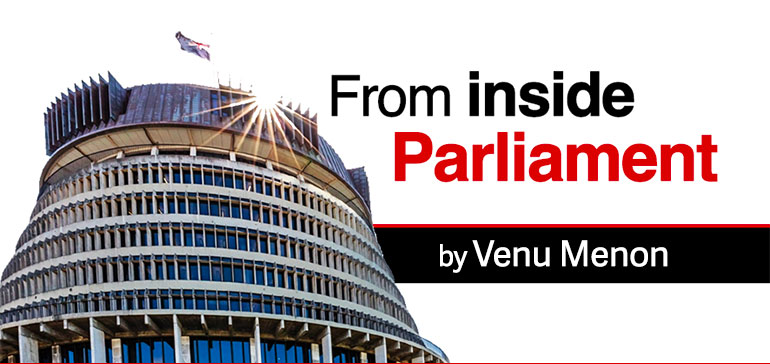Tuesday, February 21, 2023
Venu Menon in Parliament

Prime Minister Chris Hipkins, making his maiden statement in Parliament on February 21, summed up the extreme weather events that have swamped the country since the start of 2023.
First, there had been the floods that left Coromandel and Northland cut off. Then came the heavy downpour in Auckland and Waikato that claimed four lives and displaced tens of thousands of people.
“Along came Cyclone Gabrielle, which led to the declaration of a national state of emergency for only the third time in New Zealand’s history,” the PM noted.
He said Cyclone Gabrielle wrought havoc across “large parts of the North Island from Cape Reinga in the far north down to the Tararuas and the Wairarapa.”
Tai Rawhiti in the Hawke’s Bay was impacted in particular, with 10 deaths and scores still missing. Hipkins then briefed the members on the areas he visited and the heartbreaking stories he heard from families, along with the heroic tales of people rallying to provide support to those who needed it.
The prime minister maintained that “the number of people without power had come down sharply.” Households without power had fallen from 225,000 to just around 11,000, he said.
Hipkins acknowledged the number of displaced people was “countless,” while the cyclone’s impact on agriculture, horticulture and food production was “currently incalculable.”
Numerous state highways and local roads still remained closed.
The first responders, defence force personnel, police, community organisations and local marae came in for special praise from the prime minister.
He named Dave van Zwanenberg and Craig Stevens, the two volunteer firefighters who were killed in the line of duty while protecting their local community at Muriwai, and acknowledged their sacrifice.
The PM put a “multi-billion dollar price tag” on the cost of the damage caused by the cyclone. He said the local communities were key to the recovery plan, with the Central government providing support and Finance Minister Grant Robertson being the cyclone recovery minister. A lead minister will work closely with local communities in the affected regions.
The PM reiterated the announcement of a $50 million interim package to support businesses in the primary sector, as well as for additional funding to restore roads.
Hipkins said that, given the low debt levels on a per capita basis, the government was in a comfortable position to fund the recovery plan.
The PM stressed the role of climate change in extreme weather events, which were occurring more frequently.
He acknowledged that the water infrastructure “has been found badly wanting.” Just patching up ageing pipes and water treatment facilities will not do, he said.
Tackling the cost of living crisis remained the government’s key priority, the PM said. He recapped the recent measures undertaken by the government to ease inflation, such as extending the reductions in fuel tax and the half price public transport subsidies, as well as lifting the minimum wage.
However, Leader of the Opposition Christopher Luxon said the government was known for “wasteful spending, an inability to get things done, and building bureaucracies instead of improving frontline outcomes for New Zealanders.”
Luxon acknowledged the “huge physical devastation and emotional toll” left by Cyclone Gabrielle. He recounted the tales of hardship and trauma faced by New Zealanders during his visits to the impacted areas.
The National Party offered constructive support for the rebuilding effort, Luxon said. Restoring critical infrastructure such as power, water, supplies, fuel and communications was key.
A targeted short-term wage support for impacted workers and businesses, loosening the immigration settings to fast track the clean-up and the rebuild, and banks supporting their customers, as well as special legislation to speed up reconstruction were some of the solutions offered by Luxon.
But the National Party would also hold the Government to account for its spending and for its delivery, he added.
Luxon said the government’s track record over the past five years failed to inspire confidence. He said only 49 out of the 225 projects on the anvil had been completed, and just one per cent of the 100,000 KiwiBuild homes had been actually built. No major roads had been started or completed in the last five years by this government.
Luxon said $60 billion had been spent on the Covid programme, but “we don’t have a legacy of a better healthcare system.”
Violent crime had gone up by over 20 per cent, Luxon noted. “We have a ram raid every 15 hours in this country,” The country was falling behind in education as well, with almost 100,000 school-age children “chronically absent from schools.”
“Is that a First World response and set of outcomes?” Luxon asked. “No, it’s not,” he told the House.
